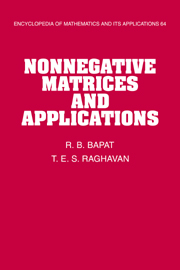Book contents
7 - Special matrices in economic models
Published online by Cambridge University Press: 17 September 2009
Summary
Mathematical precision in describing models of macroeconomies became prominent after the advent of Leontief's monumental work on input-output analysis [Leontief (1941)]. In a totally independent setting, von Neumann's model of an expanding economy gave a new impetus to the mathematical approach to economic models [von Neumann (1937)]. Economists of earlier centuries were often too ambitious in their tasks of incorporating many complex economic issues into their models. When it came to the analysis of their models they resorted to many heuristic arguments. In contrast, modern mathematical economists believe in the analytical rigor of their arguments with no ambiguity in the final conclusions. However, they too have to pay a price for the same. Often, their drastically simplified mathematical models tend to avoid the serious economic issues, such as production and capital accumulation over several periods.
In the study of an economy, many of the variables such as prices, costs of production, rates of return, intensity of operations, etc. are clearly nonnegative. With the introduction of Leontief's input-output analysis, a good linear approximation to the functioning of an economy controlled by a few firms or the state has been achieved with great empirical success [see Miller and Blair (1985)]. The theory of nonnegative matrices and M-Matrices play an important role in the study of these models.
- Type
- Chapter
- Information
- Nonnegative Matrices and Applications , pp. 275 - 314Publisher: Cambridge University PressPrint publication year: 1997

